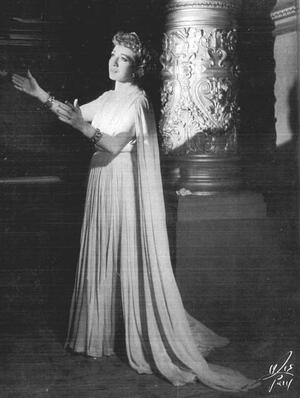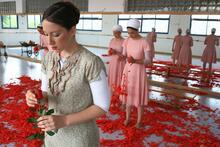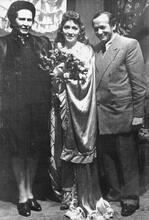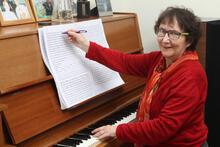Edis De Philippe
Cultural powerhouse Edis De Philippe founded the Israel National Opera Company in 1947. De Philippe made her New York opera debut in 1935 before performing with the Paris Opera and touring Europe and South America. She returned to America in 1941 before traveling to Palestine in 1945 and proposing the foundation of a local opera company. From 1947 to 1958 she produced a thousand performances throughout Israel before making a permanent home for the company in Tel Aviv. She continued to run the company until she died in 1979, training performers, commissioning new works, and inciting a love of opera in Israeli audiences. Although the National Opera Company closed down in 1982, it was revived three years later as the New Israeli Opera.
Currently one of the country’s flourishing arts, opera in Israel owes its creation primarily to singer, director, producer, and impresario Edis De Philippe, who founded the Israel National Opera Company in 1947 and ran it with an iron hand until her death on July 5, 1979, following brain surgery.
Early Life and Family
Edis De Philippe was born in New York on May 21, 1912. Her father, David Defilipov, a chemist who was born in the Ukraine, immigrated to the United States at the beginning of the twentieth century and opened a pharmacy, first in Harlem and later in Brooklyn. Her mother, Sonia née Gerdstein, arrived in the United States from Odessa when she was five years old. It was she who preserved Jewish tradition in the family, encouraged Edis’s Zionism and nurtured her daughter’s artistic talents. Edis’s education included learning numerous languages—Hebrew, Italian, Spanish, French, German, and Yiddish—as well as classical ballet, violin and, from the age of five, also piano. She appears to have inherited her vocal abilities from her grandfather and her sense of style from her maternal grandmother Selma. When Edis was six years old, Professor Walter Damrosch recommended that she concentrate on singing, forecasting that she would one day be an outstanding opera singer. Accordingly, she continued her studies with Professor Albert Zanot, who was well known as the discoverer of new talent.
Early Career and Rise to Prominence
De Philippe, who began her career as a mezzo-soprano, went on to perform as a coloratura soprano before reverting to mezzo-soprano roles such as Delilah (in Saint-Saëns’s Samson and Delilah) and Carmen. By the time she was eighteen years old, she had already appeared in a number of the musicals popular at the time, while studying major roles in both Italian and French operas. Taking a bold step, she decided to contact the American impresario Max Rabinoff, the owner of the Boston Opera and a founder of the Boston Symphony Orchestra, who was well known for having organized a countrywide tour by the Royal Ballet Company of Russia, led by prima ballerina Anna Pavlova, and who was at the time establishing the Cosmopolitan (later Metropolitan) Opera in New York. Rabinoff at once signed De Philippe to sing the leading role of Violetta in the company’s opening production, Verdi’s La Traviata, in 1935. Her performance, hailed by The New York Times, turned her into an instant success, drawing large audiences not only in New York but also in Washington, D.C., where she performed at a gala performance in honor of President Franklin D. Roosevelt’s birthday.
Edis De Philippe married Max Rabinoff in 1935 and through him became acquainted with multi-millionaires Doris Crasgi, who became De Philippe’s generous patron. Crasgi arranged tours for the singer and also paid for additional studies in the French repertoire with Metropolitan Opera conductor Wilfred Pelletier (1896–1982) and in Italian opera with La Scala’s maestro, Tullio Serafin.
In the 1946–1947 season the director of the Paris Opera, Georges Hirsch, engaged De Philippe to sing the major roles of Manon and Thaïs, both by Massenet, Mimi (La Bohème) and Violetta. Both Time and Newsweek magazines devoted full-page articles to her performances. She was invited to sing leading roles at opera houses throughout France and also appeared in London, Riga, Warsaw, Kovno, Rome, and major cities throughout South America. In 1939 she performed alongside the world-famous opera stars Tito Schipa and Jan Kiepura, as well as with Geraldine Farrar, Lili Pons, Ramón Vinay, and Bidu Sayao.
By now financially well-to-do, she separated from Rabinoff, signed contracts with Metro-Goldwyn-Mayer to star in opera films, and for five years presented a Coca–Cola-sponsored program on Radio Mexico City, while also appearing at the Mexico International Opera. When her rich patron expressed a desire to adopt her and bequeath her fortune to her on condition that she convert to Christianity, De Philippe rejected the proposal and broke off their relationship.
Founding of the New Israeli Opera
The most important turn in De Philippe’s career occurred as a result of World War II and the Holocaust. When the war broke out she was performing at the Opéra in Paris and suddenly found herself among a circle of Jewish singers and musicians who had recently fled Nazi Germany. She planned to emigrate to Palestine and establish an opera company, but instead she found herself being sent back to the United States in 1941, on orders of the American ambassador to France, who had arranged for the evacuation of American citizens. Not until February 1945 was she able to make her way to Palestine at the initiative of some of the leaders of the Jewish community in Palestine prior to the establishment of the State of Israel. "Old Yishuv" refers to the Jewish community prior to 1882; "New Yishuv" to that following 1882.Yishuv. After appearing in recitals and guest performances with the Palestine Folk Opera established by George Singer and Marc Lavry in 1940, which performed only intermittently, touring the country, she was urged to establish a permanent local company. She agreed, and in December 1946 she presented her scheme to the Zionist Congress in Basel, at which she also gave a recital and, amazingly, won approval for the establishment of a national opera company. On November 29, 1947, the day of the United Nations vote to partition Palestine, De Philippe mounted a gala performance of selections from operas, which was soon followed by a full production of Thaïs in which she performed the title role. Between 1947 and 1958 she produced one thousand performances throughout the country, renting the Habimah theater in Tel Aviv for one day a week, and all the while using her own money to finance the operations. She also imported scenery, splendid costumes, wigs, and make-up materials such as were unavailable in Palestine. At the height of its activities, the company had two hundred and sixty-five artists and other tenured employees.
An outstanding and determined administrator, the temperamental De Philippe succeeded in gathering a group of devoted admirers, though her autocratic methods also aroused considerable criticism, as did her tendency to create a repertoire composed largely of works in which she could fill the major role. Simcha Even-Zohar, secretary-general of the central committee of the Histadrut, who had been asked to help her in her initial work in the country, became her administrative assistant. When they married on August 5, 1950, he took over most of the opera’s administration.
In 1958 De Philippe was given the keys to the building at 1 Allenby Street in Tel Aviv, which had served as the first seat of the Lit. "assembly." The 120-member parliament of the State of Israel.Knesset. With an auditorium that seated over nine hundred, this remained the home of the Israel National Opera until 1982, when lack of government and municipal funding forced the opera to close down. It was resuscitated in 1985 as the New Israeli Opera.
During the period in which she headed the company, De Philippe trained a large number of Israeli and foreign singers, including Plácido Domingo (b. 1937), who arrived in Israel in 1962 and stayed for three years under her tutelage. (As the musical director of the Washington and Los Angeles Operas, this great star maintained his connection with the present Israeli Opera through co-productions by the two companies.) In addition to mounting more than two hundred operas, operettas, musicals and ballet repertoire, Edis De Philippe commissioned Menahem Avidom to compose Alexandra, a three-act opera, the libretto of which, by Aharon Aschmann, was based on the latter’s Alexandra the Hasmonean.
Later Life and Legacy
Despite a number of attempts to wrest exclusive control of the company from her hands, as recommended by several public commissions, De Philippe remained its mistress, defiantly appointing her own board of directors and advisory council. In her opinion, directing an opera company mandated a dictatorship, not a democratic process, and this in turn implied the presence of an authoritative, experienced director able to build up a supportive public.
She certainly succeeded in implementing her conception. The music-loving Israeli public thronged to operas she produced. She educated an entire generation to love the Israel National Opera. The present company owes much of its success to the foundations she so passionately laid.
Fittingly, in 2005 the municipal council of Tel Aviv-Jaffa voted to name a street in Jaffa after her.
De-Philippe, Edis, Arieh Levanon, Alexander Tarsky, and Franz Lehár. 1976. ha-Almanah ha-ʻalizah: [program]. Tel-Aviv: ha-Operah ha-Yiśreʼelit.
Olitsḳi, Yosef. 1983. Edis: peraḳim be-toldot ḥayeha shel Edis dah-Filip : ha-meyasedet, ha-minahelet ṿeha-bimaʼit shel ha-Operah ha-Yiśreʼelit. Tel-Aviv: Aḥdut.
International Congress of the History of Art, and Irving Lavin. 1989. World art: themes of unity in diversity: acts of the XXVIth International Congress of the History of Art. University Park [Pa.]: Pennsylvania State University Press.






